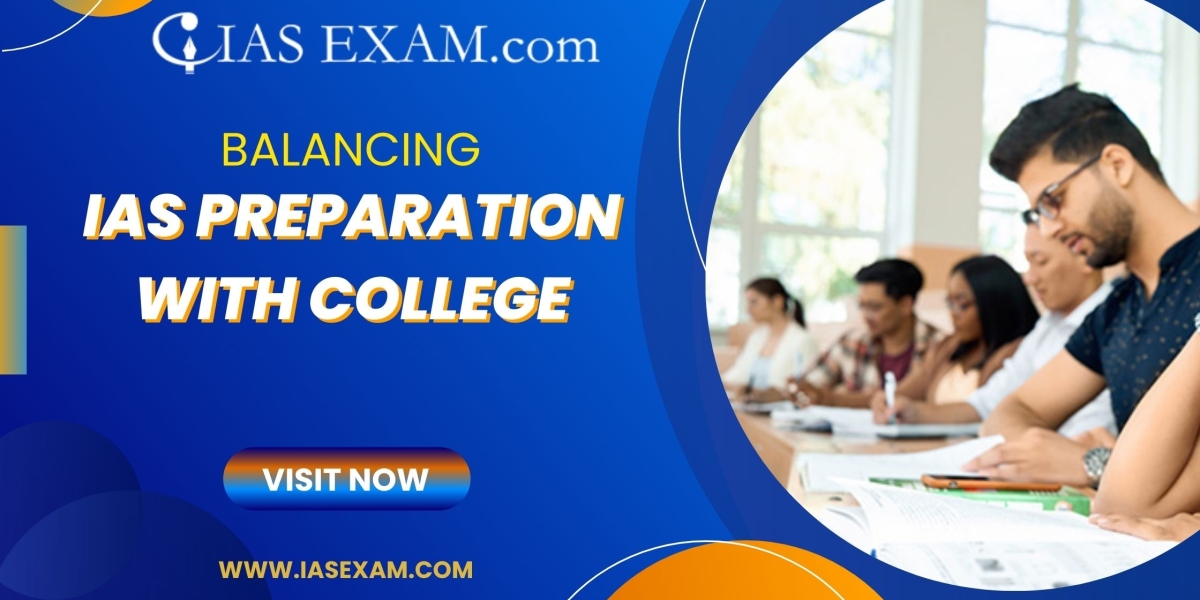Imagine juggling two flaming torches, each representing the colossal tasks of acing your college exams and cracking one of the most challenging tests in India - the Indian Administrative Services (IAS) examination. This might seem like an act reserved for a circus performer, but it is a reality for thousands of aspirants who strive to balance their college education with IAS preparation. The relentless pursuit of excellence in both arenas can often feel like navigating through a labyrinth, where time is both an ally and an adversary. But what if we told you that mastering the art of time management could turn these seemingly insurmountable challenges into achievable milestones?
In this article, we delve deep into practical strategies that promise not just survival but success in managing the twin demands of college studies and IAS preparation. By weaving together expert advice and tried-and-tested methods, we illuminate a path that leads to maximizing productivity without sacrificing your sanity. Whether you're struggling to keep up with your college assignments while keeping an eye on the UPSC syllabus or finding it hard to carve out study hours without burning out, our guide offers beacon lights to navigate through this demanding journey. Get ready to embark on a transformative adventure where every second counts!
Introduction: The Challenge of Dual Commitments
Embarking on the journey of preparing for the Indian Administrative Services (IAS) exam while navigating through college coursework is akin to treading two distinct yet demanding paths simultaneously. This unique challenge presents a compelling dichotomy - the relentless pursuit of academic excellence alongside the rigorous preparation for one of India's most prestigious examinations. It's a test not only of knowledge but also of time management, resilience, and strategic planning. Every aspirant dreams of cracking the IAS exam, yet few manage to find harmony between this aspiration and their college commitments.
The essence of successfully juggling these dual commitments lies in transcending conventional study approaches and embracing innovative strategies that ensure progress on both fronts without compromising on well-being. It’s about redefining priorities, where each day is meticulously planned to accommodate lectures, self-study, revision, mock tests for IAS prep while ensuring there’s room for personal growth and relaxation. This equilibrium is not achieved overnight but through persistent effort and adaptive strategies that evolve with one’s schedule and capacity. Delving into this intricate dance between college responsibilities and IAS preparation unravels new perspectives on overcoming challenges—highlighting not just the importance of discipline but also flexibility in one's approach towards achieving extraordinary outcomes.
Understanding the IAS Exam Requirements
Diving into the labyrinth of IAS Exam Preparation requires not just hard work but a profound understanding of its intricate requirements. It's akin to training for a marathon where knowing the route, climate, and hurdles is as crucial as your physical preparedness. The IAS exam intricacies stretch beyond mere subjects to a comprehension of what UPSC seeks in a future administrator: analytical prowess, ethical reasoning, and a deep-seated understanding of India’s socio-political landscape. This holistic approach demands that aspirants tune their college education and extracurricular engagements towards building this acumen. Leveraging college projects or internships on governance, public policy, or societal issues can serve as dual fronts; enriching your resume while sculpting your mindset into that of an aspiring civil servant.
Transitioning smoothly from textbooks to the realms of current affairs and reports by various organizations becomes vital in threading together the narrative needed for IAS exams. Cultivating a habit to critically analyze everyday news, juxtapose it with historical data and project potential impacts on policy-making can elevate one's preparation from being merely academic to dynamic and real-world oriented. Integrating this habit amidst college schedules might seem daunting but visualizing it as partaking in live case studies helps bridge the gap between collegiate learning and UPSC's expectations. Thus, weaving these elements into one’s daily life becomes less of an additional task and more of an enriched way of perceiving the world - precisely what being an IAS officer entails.
Prioritizing Your Time: Essentials First
In the throes of juggling IAS preparation alongside college demands, it becomes paramount to approach time management with a surgeon's precision—a meticulous prioritization of essentials is not just recommended; it’s essential. The treacherous lure of getting entangled in less significant tasks masquerading as urgent can derail even the most earnest efforts. To navigate this, imagine your day partitioned into blocks, with each dedicated to a specific aspect of your dual objectives. Such visualization fosters an environment where priority tasks are not merely attended to but given the uninterrupted focus they warrant.
This journey necessitates cultivating an unyielding discipline towards identifying and honoring your high-value activities first. Consider adopting a strategy akin to placing large rocks in a jar before sand; if you start with sand—your lesser tasks—there will be no room for the rocks—your critical study sessions or essential college assignments. By flipping this approach, and tackling your essentials first, you find yourself not only advancing steadily towards your IAS dream but also ensuring that the cornerstone elements of your academic pursuits remain uncompromised. This deliberate methodology doesn’t confine itself to mere academic triumphs; it evolves into a lifelong habit of discernment and efficiency, proving potent in myriad facets of life beyond books and exams.
Integrating IAS Study into College Life
Integrating IAS (Indian Administrative Service) study into college life presents an invaluable opportunity to layer your learning with a rich tapestry of insights, preparing for one of India's most prestigious examinations while navigating through the academic ambitions of college. This unique blend not only sharpens the intellect but also inculcates a discipline that benefits both endeavors. One innovative approach is leveraging your academic curriculum as a foundational tool for IAS preparation. Many subjects taught in college, especially if you're enrolled in humanities or social sciences, directly overlap with the IAS syllabus, providing a deep dive into critical topics that form the bedrock of the civil services examination.
Transitioning from merely attending classes to actively engaging with the content through the lens of IAS preparation transforms passive learning into an active quest for knowledge. It involves re-imagining classroom lectures as interactive sessions that contribute to your IAS dream, where every assignment morphs into an opportunity to explore issues from multiple perspectives—a crucial skill for cracking the UPSC exam. Furthermore, embedding this dual focus encourages smart study techniques such as mind mapping and integrated note-taking, bridging concepts from textbooks to real-world applications seen in governance and administration. Thus, by intertwining IAS studies with collegiate obligations, aspirants can carve out a pathway not just towards academic success but towards becoming enlightened future leaders who value knowledge application over mere accumulation.
Effective Study Techniques for Efficient Learning
Amidst the tight rope walk of balancing IAS preparation with college commitments, mastering efficient learning techniques can be your secret weapon. Ever considered the Pomodoro Technique? It's not just a buzzword. By breaking down study sessions into focused intervals (traditionally 25 minutes), followed by short breaks, it allows you to maximize concentration and minimize burnout. This method isn’t just about keeping time; it’s about optimizing your brain’s ability to retain information in compact, manageable blocks, making those marathon cram sessions a thing of the past.
But here's an innovative twist: merge this with thematic learning. Instead of juggling subjects at random, align them around themes or current events that are relevant to both your college syllabus and the IAS exam prep. For instance, if you're studying Indian Polity for IAS alongside a college course on the Constitution of India, synergize these topics for dual reinforcement. This thematic cross-pollination not only deepens understanding but also creates intriguing interlinks that make recall in high-pressure situations like exams notably smoother and faster. In merging these tactics - short yet potent study sessions with interconnected learning themes - you craft a tailored strategy that propels you towards mastery in both arenas without feeling overwhelmed by either.
Dealing with Stress and Avoiding Burnout
In the rigorous journey of preparing for the IAS exams while managing college studies, it is crucial not just to balance time but energy as well. One seldom discussed yet groundbreaking strategy in this context is embracing 'selective depth'. This involves diving deep into subjects or areas that truly ignite your passion or have significant overlap between your college curriculum and IAS syllabus, allowing for an efficient mastery over topics. By doing so, you ensure a more engaged learning process, effectively dodging the common pitfall of surface-level cramming which often leads to stress and burnout.
Additionally, integrating 'mindfulness breaks' into your study routine can serve as a powerful antidote to building stress. This doesn't necessarily mean long hours away from your desk; instead, small pockets of time dedicated to mindful breathing or short walks can significantly enhance cognitive flexibility—it's about quality over quantity. These practices help in resetting the brain, enabling a fresh perspective towards problem-solving and learning. In essence, navigating through the pressures of balancing IAS preparation with college demands innovative approaches that prioritize mental well-being alongside academic excellence—ensuring not just success but sustained enthusiasm throughout your journey.
Conclusion: Harmonizing Ambitions for Success
As the journey of balancing IAS preparation with college draws to a close, harmonizing ambitions emerges as the linchpin for success. This delicate equilibrium is not found in sprawling hours of undirected effort but in the artful orchestration of priorities, where each task is imbued with purpose and direction. The confluence of academic pursuits and civil service aspirations can indeed coalesce into a symphony of achievements, provided one masters the subtleties of time management and self-discipline.
Adopting an integrative approach towards IAS preparation and college studies opens up a vista of opportunities that extends beyond mere academic success; it cultivates resilience, fosters adaptability, and hones critical thinking skills. These are invaluable assets on any career path but especially so for aspiring civil servants who must navigate complex challenges. Therefore, let your ambitions sing in harmony rather than compete for dominance. It’s this synchronized rhythm between goals that transforms formidable hurdles into stepping stones toward your zenith of success.











